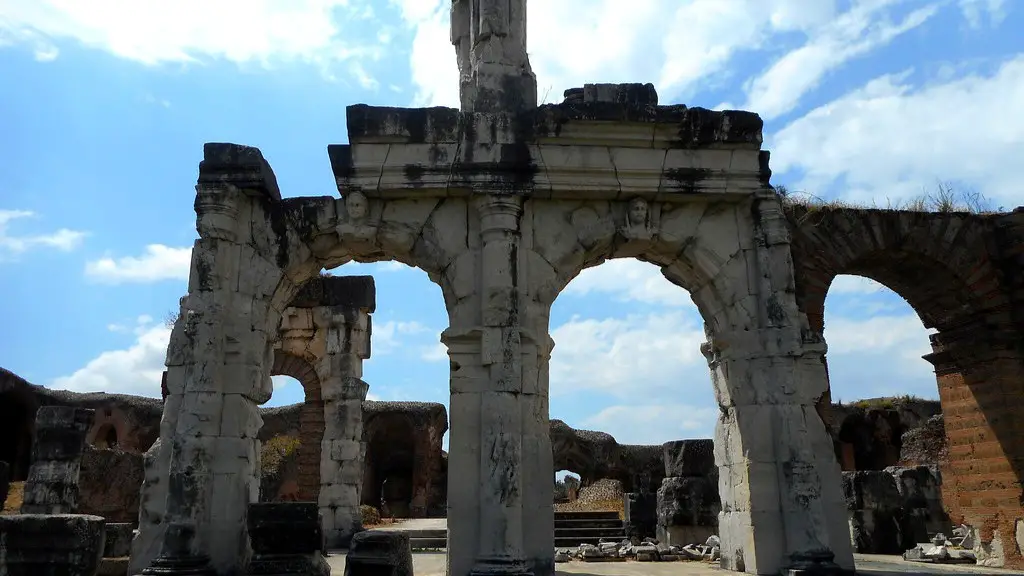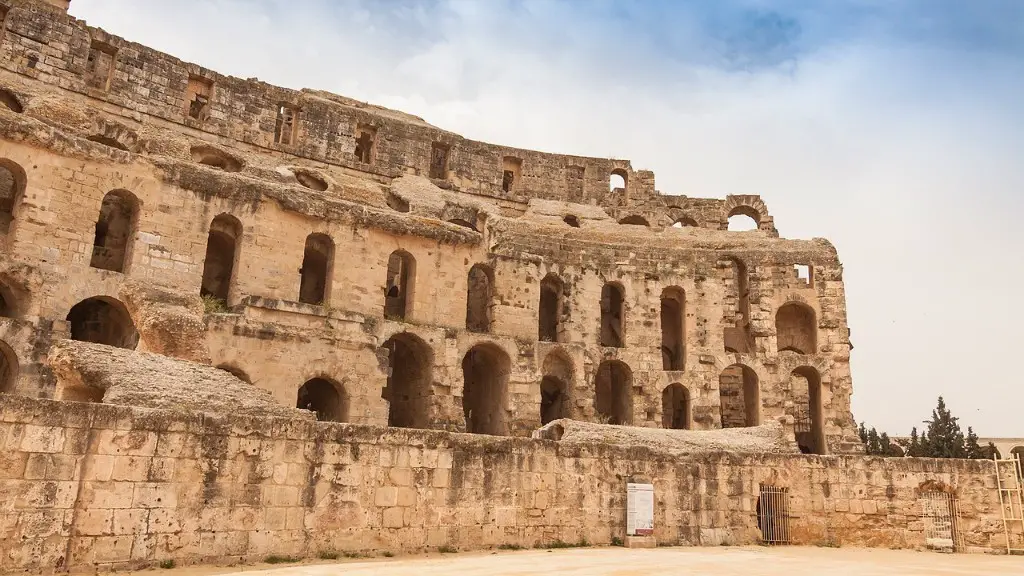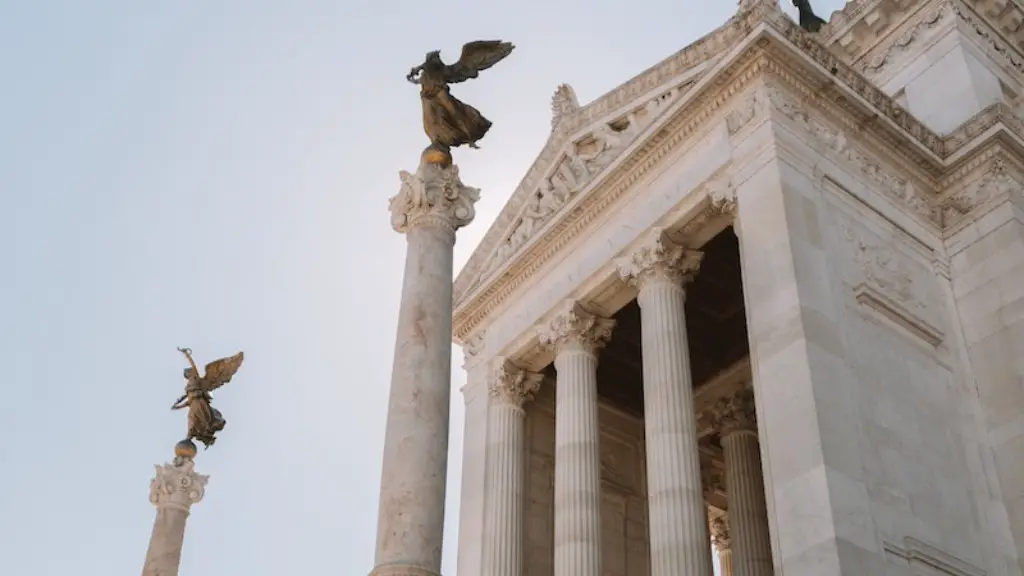Roman Libraries and Archives
Ancient Rome was one of the most influential and advanced civilizations of the world. It was also known for its culture, architecture, and political organization. Along with this, Rome has a reputation for its educational institutions, particularly its libraries and archives. Libraries were an old tradition in Rome, dating back to the Republic period, when Roman elites stored private texts in their homes. Notable examples of Roman libraries included the prestigious Temple of Apollo Palatinus and the Temple of Hercules Victor.
The primary purpose of these ancient libraries was not only to store and preserve texts, but also to use the information within them to advance knowledge. With the rise of classical philosophy, rhetoric, and medicine in Rome, libraries and archives became increasingly important. During the first century, the Roman Empire built and maintained a vast number of public libraries, most of which were attached to temples. These libraries fostered the spread of literacy and knowledge throughout Rome.
Apart from these libraries, Roman scribes also maintained private archives, which contained historical documents, legal records, and private texts. These archives were usually located in the homes of prominent Roman citizens, such as senators and patricians. These archives served as an important source of information and evidence, helping the Romans to better understand their past and present. Roman statesmen and intellectuals often kept personal archives of their own work, which have provided invaluable insight into the Roman civilization.
In addition to libraries and archives, the Romans also had the practice of annalists, who kept detailed records of important Roman events and assembled them into chronicles. These chronicles, known as annales, formed the backbone of Roman historiography. Annales were not only used by Roman historians, but also by Roman lawyers and statesmen for legal and political decisions. Furthermore, annalists also served as impartial judges, recording court decisions that were impartial and fair.
The significance of Roman libraries and archives in their society cannot be underestimated. They served as a main source of knowledge, providing ancient Romans with the essential tools to think critically and advance their understanding of the world. Furthermore, their archives provided researchers and scholars with invaluable sources of information. The Roman archives, in particular, provided valuable insight into the Roman legal system, government, and culture. They also helped to preserve the vast corpus of literature and artifacts from the Roman period.
Temple of Apollo Palatinus
The Temple of Apollo Palatinus was one of the most important ancient libraries in Rome. It was built at the end of the second century A.D. on the Palatine Hill and contained a vast collection of books and scrolls. The library was founded by Tiberius in order to provide a place for the study of Greek and Latin literature. It also contained a number of Latin manuscripts of classical authors, such as Cicero, Horace, and Livy.
The library was organized into three levels: the Atticus library, the library of Antoninus Pius, and the library of Domitian. The Atticus library contained aesthetical and philosophical texts, while the Antoninus library contained works of Roman history and law. Lastly, the Domitian library contained texts on science, religion, and medicine. In addition to its literary works, the Temple of Apollo Palatinus also contained an observatory and a number of scientific instruments.
The library at the Temple of Apollo Palatinus was used by both Roman citizens and foreign scholars. Notable figures in Roman history, such as Marcus Tullius Cicero, Marcus Vitruvius Pollio, and Sallust, are known to have visited the library. It was an important center of learning and knowledge, and remains one of the most significant Roman libraries ever built.
Temple of Hercules Victor
The Temple of Hercules Victor was one of the earliest libraries in Rome. It was located on the Campus Martius, the field of Mars, and was dating back to the 4th century B.C. The library contained both Latin and Greek manuscripts and was maintained by the priestly college of the Salii. It was one of the largest and most important libraries in the city and one of the most important in the Roman Republic.
The library at the Temple of Hercules Victor contained a variety of texts, ranging from philosophy to science and mythology. Its collection was particularly noteworthy for its number of Greek manuscripts, which included works by Plato and Aristotle. The library was also known for its educational purposes, as it was the site for some of the most renowned lectures in Rome. It was a major source of knowledge and was often visited by scholars from all over the Mediterranean.
The library at the Temple of Hercules Victor was an exceptionally important source of knowledge and learning for the Roman Empire. It was one of the few sources for Greek manuscripts in ancient Rome and remained an important center of learning until the fall of the Empire. It served as an essential source of knowledge for Roman citizens, inspiring them to think critically and leading them to greater understanding of the world around them.
Archives of Roman Civilization
The archives of Roman civilization are some of the most significant sources of information on the Roman Empire. These archives contain texts and documents that help historians and scholars gain valuable insights into the Roman way of life. Roman archives were often private collections and were maintained by prominent citizens, such as statesmen, patricians, and senators. They served as a repository of knowledge and evidence which could help Romans understand their past and present.
The archives of Roman civilization contain a variety of documents, including court proceedings, legal texts, historical records, and private texts. They provide invaluable information on Roman government, law, and culture. Furthermore, they provided researchers and scholars with invaluable sources of information and insight into the Roman civilization. They were also used by Roman historians and statesmen for legal and political decisions.
The archives of Roman civilization were an essential source of knowledge for the Roman Empire. They were an important source of information and evidence that helped the Romans to better understand their past and present. Furthermore, they provided researchers and scholars with invaluable sources of information that have helped us to gain a deeper understanding of the Roman civilization.
Roman Annalists
Roman annalists were writers who kept records of important Roman events, such as battles, natural disasters, and the rise and fall of emperors. These records were assembled into chronicles, known as annales, which formed the backbone of Roman historiography. Annales were not only used by Roman historians, but also by Roman lawyers and statesmen for legal and political decisions. Furthermore, annalists also served as impartial judges, recording court decisions that were impartial and fair.
The annales of ancient Rome were an essential source of information and knowledge. They provided valuable insights into Roman government, politics, culture, and history. Furthermore, they helped to preserve the vast corpus of literature and artifacts from the Roman period. The annales of the Roman Empire have been studied by scholars for centuries and have provided invaluable information about the Roman civilization.
The practice of annalists was one of the most important traditions in ancient Rome. Annalists served as impartial judges and recorded court decisions that were impartial and fair. Furthermore, their annales provided valuable insights into the history and culture of the Roman Empire. These annales are still studied today and have provided invaluable insights into the Roman civilization.
Importance of Roman Libraries and Archives
Roman libraries and archives were an essential part of ancient Roman culture and civilization. They served as a main source of knowledge, providing ancient Romans with the essential tools to think critically and advance their understanding of the world. Furthermore, their archives provided researchers and scholars with invaluable sources of information. Roman libraries and archives have provided invaluable insight into the Roman legal system, government, and culture.
Apart from their importance to scholars, Roman libraries and archives were also used for leisure reading and study by Roman citizens. These libraries were an important source of education and learning for the Roman citizens and allowed them to become more knowledgeable and enlightened. The Roman archives and libraries also aided in the spread of literacy throughout the Roman Empire, helping to foster intellectual pursuits.
The importance of Roman libraries and archives cannot be understated. They served as a main source of knowledge, providing Roman citizens and scholars with the essential tools to think critically and advance their understanding of the world. Furthermore, their archives provided researchers and scholars with invaluable sources of information. Roman libraries and archives have provided invaluable insight into the Roman legal system, government, and culture.





